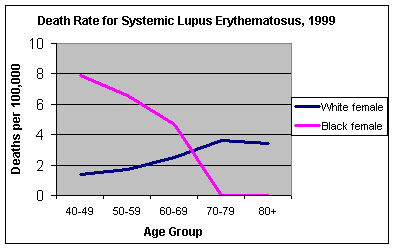Lupus and African Americans
Lupus is an acute and chronic (long-term) disease in which the immune system, for unknown reasons, starts attacking normal tissue, especially the skin, joints, blood and kidneys. The most severe form of lupus is systemic lupus erythematosus (S.L.E.), which can affect almost any part of the body, and has a wide variety of symptoms.
Who Gets Systemic Lupus?
The following factors appear to influence whether a person will get S.L.E., and how the disease progresses if one has it:
- Sex (Females get lupus at much higher rates than males)1
- Race (African Americans and Hispanics get lupus at higher rates overall than whites)2
- Socioeconomic-demographic factors (i.e. age, income, employment, education, and health insurance)
- Genetics
- Environment
Race Differences
Recent research suggests that race has a significant impact on some aspects of the disease. This information comes from the study LUpus in MInorities: NAture versus Nurture (LUMINA), conducted by researchers from the University of Alabama and the University of Texas.2 So far, the LUMINA study shows that both African American lupus patients tend to:
- Have more severe disease overall than white patients.
- Develop lupus earlier in life
- Experience greater disease activity at the time of diagnosis (including kidney problems)
- Have a higher frequency of neurological problems such as seizures, hemorrhage (internal bleeding) and stroke.
LUMINA researchers found that in addition to race, socioeconomic-demographic factors such as age, income, employment, education, and health insurance seem to play a major role in the course of lupus. Many of these factors are associated more with the African Americans than white patients, which may begin to explain the worse disease outcomes for African Americans.
This graph shows that until they are about 65 years old, African American women die from lupus at a much higher rate (recorded as number of deaths out of 100,000 individuals) than white women:
SOURCE: CDC, “Deaths for 358 Selected Causes, by 5-Year Age Groups, Race, and Sex: United States, 1999-1999,” table 292, p. 305.
If You Have S.L.E.
There is no known way to prevent lupus, and a cure has not yet been identified. However, S.L.E. can generally be controlled with medications. A large percentage of people with S.L.E. lead a normal lifestyle and live out an average lifespan. Many people have careers and family. Some may find themselves facing limitations and lifestyle changes- the situation is different for each person.
Many employers are willing to make changes in the work place to accommodate employees with S.L.E. Vocational rehabilitation (career retraining) may help you find a career suited to your physical needs. If working is no longer possible, there are state and federal disability programs in place for individuals with lupus.
Maintaining an optimistic outlook, taking advantage of social support from friends and family, and accepting the disease as part of your life can all have a positive impact on the course that the disease takes. You may want to:
Find a lupus support group. The Lupus Foundation of America and the Arthritis Foundation are two organizations with excellent programs. There are many “virtual” support groups on the Internet, as well as in-person networks of individuals with lupus.
Educate friends and family, and enlist their help. Often, S.L.E. is not an easy disease for others to understand. You may have no visible symptoms. It is important to help friends and family get a sense what you are going through, and to accept their help when it is available.
Maintain a social life. It is not always easy to push yourself to get out and enjoy the company of others. And you will need to choose outings that fit your comfort level. Be creative and you will find ways to enjoy others without taxing yourself. Be proactive and stay in touch with friends.
References
1Lahita, RG, “Causes, Symptoms, Testing, Treatment,” Lupus Foundation of America, 1998. (http://www.lupus.org/).
2Alarcón GS, et al. Systemic lupus erythematosus in three ethnic groups: III. A comparison of characteristics early in the natural history of the LUMINA cohort. Lupus in minority populations: Nature vs. Nurture. Lupus 1999; (3): 197-209 (appears in www.niams.nih.gov/ne/highlights/spotlight/2000/lumina.htm)
For more information:
Go to the African American Health health topic.
